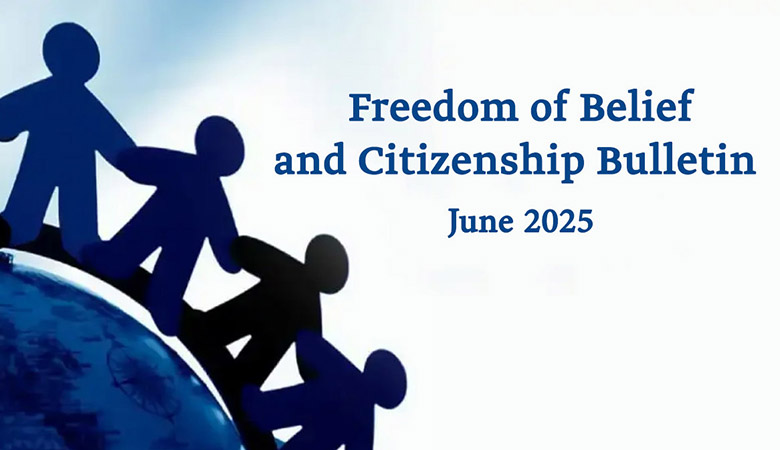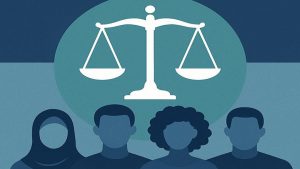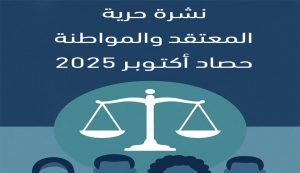july 2 , 2025
The Egyptian Commission for Rights and Freedoms issues its “Freedom of Belief and Citizenship” bulletin to shed light on the concerns and problems faced by minorities, to promote a culture of tolerance, reject violence and hate speech, and to reinforce the values of citizenship. In this edition, the Commission highlights the most notable developments and violations related to freedom of belief and citizenship during June 2025.
The 2014 Constitution stipulates in Article 2 that: “Islam is the religion of the state… and the principles of Islamic Sharia are the main source of legislation.”
The Egyptian government officially recognizes only Islam, Christianity, and Judaism, and only followers of these religions are permitted to practice their religious rites and build places of worship.
Article 7 of the Constitution obliges the Muslim majority to adhere to the teachings of a single religious institution, Al-Azhar, which is defined in the article as “the main reference in religious sciences and Islamic affairs.” This opens the door for justifying violations against other Muslim religious minorities such as Shiites, Quranists, and the Ahmadiyya community.
Courts also seek Al-Azhar’s opinion in cases of alleged religious contempt, and its approval is a prerequisite for any other Islamic religious groups to publicly perform their religious practices.
Article 64 of the Constitution states that freedom of belief is absolute, but it limits its application to followers of the three officially recognized Abrahamic religions: Islam, Christianity, and Judaism. In other words, the Constitution does not recognize any other religions.
Judicial rulings regarding unrecognized religious groups often support the decisions of official authorities or state-sanctioned religious institutions.
Respecting a citizen’s freedom of belief and their right to change their religion or sect is a human, personal, and constitutional right. This right must not be subjected to pressure from any source — whether the state, religious institutions, or civil society.
In this context, a state governed by the rule of law must be established — one that guarantees full, undiminished citizenship rights for all Egyptians, regardless of religion, belief, origin, gender, language, or political affiliation. The constitutional right to citizenship must be translated into laws and legislation grounded in international human rights covenants and agreements.
A law should also be enacted to criminalize discrimination based on religion, ethnicity, or belief — and to provide compensation for those subjected to such discrimination.
Highlights of Developments and Violations Related to Freedom of Belief and Citizenship – June 2025
News on Freedom of Belief and Citizenship:
June 4, 2025: Dr. Nazir Mohamed Ayad, Grand Mufti of the Republic and Secretary-General of the General Secretariat for Fatwa Authorities Worldwide, led an extensive dialogue session to launch a comprehensive national campaign aimed at building youth awareness and addressing the intellectual, social, and psychological challenges they face. The session included participation from various ministries and institutions involved in education, culture, media, Al-Azhar, and the Egyptian Church.
The Mufti emphasized that the campaign comes at a critical time, given the widespread proliferation of distorted concepts and increasing challenges facing youth amid the overwhelming influence of social media platforms. He stressed that building awareness is not a luxury or a choice—it is a national necessity that protects minds, strengthens identity, and fosters belonging through a wise and calm discourse grounded in reality and attuned to youth needs, emphasizing role models over indoctrination and prioritizing compassion and inclusion over judgment and confrontation.
He added that Dar Al-Iftaa, with its academic tools and field expertise, is extending its hand to all state institutions to participate effectively in this campaign, which aims to spread reliable knowledge, correct misconceptions, and respond to suspicions in contemporary language. The initiative also calls for improving content directed at youth and promoting successful educational models, such as youth-led initiatives, early youth programs, and value systems in education and media.
June 5, 2025: The Holy Synod of the Coptic Orthodox Church, presided over by His Holiness Pope Tawadros II, issued an official statement warmly welcoming the Church’s hosting of the 6th International Conference of the World Council of Churches. The event is being held to commemorate the 1,700th anniversary of the First Ecumenical Council of Nicaea (325 CE)—a pivotal council in the history of the universal Christian Church.
This hosting affirms the Coptic Church’s doctrinal authenticity and central role in the journey of Christian faith since the early centuries. It also reflects its commitment to dialogue and cooperation with churches in both the East and West on matters of faith and joint action.
The conference is considered one of the most anticipated ecumenical events worldwide in coming years due to its symbolic and theological significance.
June 5, 2025: During the closing session of the regular meeting of the Holy Synod of the Coptic Orthodox Church, presided over by Pope Tawadros II, Bishop Younan of Assiut was elected as the new Secretary of the Holy Synod for 2025, succeeding Bishop Daniel of Maadi.
The decision, welcomed by attending bishops from inside and outside Egypt, marks Bishop Younan’s return to a key leadership position, the second-highest administrative post after the Pope. Bishop Angelos of North Shubra affirmed that the choice was consensual, citing Bishop Younan’s extensive experience and active participation in various synod committees.
June 6, 2025: His Holiness Pope Tawadros II, Pope of Alexandria and Patriarch of the See of St. Mark, made a phone call to His Holiness Pope Leo XIV of the Vatican to congratulate him on his official election as leader of the Roman Catholic Church. Pope Tawadros expressed hope that the coming period would witness enhanced cooperation between the two churches, affirming the Coptic Church’s support and affection.
June 8, 2025: Monks of Saint Catherine’s Monastery closed the monastery to visitors in protest a court ruling granting the state ownership of the lands surrounding the monastery, limiting the monks to mere “usage rights.”
An Egyptian administrative court ruled those lands belonging to the monastery—including gardens and vineyards—are state property, according to a statement from the Catholic News Agency. The monks accused the state of ignoring historical documents proving their long-standing ownership, calling the ruling a “dangerous precedent.”
They stated that the ruling puts the monastery’s future at risk by restricting their freedom and affirming state control. Legal representative Christos Kompileris warned that the new situation puts the monastery’s fate at the mercy of unpredictable political or administrative decisions.
June 17, 2025: The Egyptian Catholic Center for Cinema, in collaboration with the Franciscan Schools Committee, hosted the third season of the acclaimed artistic competition “Franciscan’s Got Talent.” The event included widespread participation from Franciscan school students across Egypt.
In his speech, Father Boutros Daniel, Director of the Catholic Center, emphasized that supporting the arts is not a luxury but a necessity, particularly in confronting the violence and hatred prevalent in society. He said: “Art and creativity are the most refined means to build humanity and spread values of love and peace. Today we celebrate the third season of this pioneering initiative, which continues to grow year after year.”
The competition featured various artistic fields—singing, acting, musical performance, painting, poetry, and young broadcasting—encouraging dozens of young talents, boosting children’s self-confidence, and enhancing their expressive and artistic abilities.
June 18, 2025: On the International Day for Countering Hate Speech, the Islamic Research Academy at Al-Azhar stressed that such speech poses a direct threat to social peace and human coexistence. It fosters violence and discrimination in all forms, making its confrontation a shared moral and humanitarian duty.
The Academy affirmed the need to uphold human dignity regardless of religion, race, or color, and warned of the growing manifestations of hate—particularly against Muslims in several Western countries. These are exacerbated by certain media and digital platforms that promote hate speech and undermine the foundations of coexistence and peace.
The Academy strongly condemned the rise in hate speech against Muslims and the accompanying smear campaigns and false stereotypes that drive exclusion, discrimination, and violence—depriving Muslim communities of basic rights and equality. Such practices, it stressed, violate international law and ethical values essential to pluralism and religious freedom.
June 20, 2025: The Muslim Council of Elders, led by Grand Imam Dr. Ahmed Al-Tayeb, emphasized that the refugee crisis is no longer a temporary humanitarian issue—it is a persistent moral test of the world’s conscience and its commitment to justice, compassion, and equity.
In a statement marking World Refugee Day (June 20), the Council called for urgent international action to find fair solutions, provide support, and enact binding international legislation to protect refugees and uphold their dignity.
The Council noted that refugees are not just numbers—they are human stories reflecting the suffering of individuals and families stripped of safety and stability. It emphasized that supporting refugees goes beyond emergency aid, requiring efforts to address root causes and ensure safe and voluntary return for the displaced.
June 21, 2025: Activists shared alarming footage online showing bulldozers and heavy equipment operating next to the Virgin Mary Church in Maadi—one of the key sites on the Holy Family Trail in Egypt. The scenes sparked public concern and calls for clarification.
Members of the church issued an urgent appeal to the President of Egypt to halt what they described as “dangerous violations” affecting the area’s unique religious and historical value. The church had previously reached an official agreement with relevant ministries and Cairo Governorate to develop the site in line with national heritage preservation plans.
June 23, 2025: MP Dr. Freddy El-Bayadi submitted an urgent inquiry to the Prime Minister and the Ministers of Local Development and Tourism and Antiquities concerning reports of demolition, land clearing, and tree cutting around the Virgin Mary Church in Maadi.
This move came days after another inquiry by the same MP regarding concerns about the area surrounding Saint Catherine’s Monastery—reflecting his commitment to protecting Egypt’s religious heritage.
In his statement, the MP noted that the Maadi church is a key stop on the nationally significant and internationally recognized Holy Family Trail. Despite a signed protocol in March 2019 between the Church, Cairo Governorate, and the Ministry of Tourism, reports of violations have continued. He stressed that this church serves as both a spiritual and geographic link between the northern and southern segments of the Holy Family’s journey.
June 23, 2025: Archbishop Dr. Samy Fawzy, Archbishop of the Anglican Province of Alexandria, visited Grand Imam Dr. Ahmed Al-Tayeb to thank him for his continued support for interfaith dialogue and cooperation with the Church. The visit was attended by Bishop Dr. Mounir Hanna and Rev. Dr. Matthew Anderson.
Archbishop Fawzy praised the Grand Imam’s support for the “Learning Journey” conference organized by the Anglican Church to promote mutual understanding. He also commended the Imam’s encouragement of the Christian-Muslim Center, a major project aimed at building interfaith bridges.
He expressed deep appreciation for the strengthening ties between the Anglican Church and Al-Azhar, noting that the center’s programs and initiatives play a vital role in enhancing cooperation.
June 27, 2025: Rev. Dr. Andrea Zaki, President of the Evangelical Community of Egypt, concluded a pastoral visit to Upper Egypt by presiding over the installation of Pastor Emad Sami at the Evangelical Church in El-Masoudi, and Pastor Peter Sami at the Evangelical Church in Abou Tig, both in Assiut Governorate.
The ceremonies were attended by Rev. Moussa Akladios, Head of the Nile Synod; Rev. Martin Elias, Head of the Assiut Evangelical Presbytery; other church leaders; and prominent public and executive figures in Assiut.
Dr. Zaki congratulated the newly appointed pastors and their communities, expressing joy at sharing these happy occasions with both Muslims and Christians in Assiut. He said: “Your presence and participation in these celebrations is a sincere expression of the love and true partnership we cherish. This unity reflects a shared life marked by affection and belonging.”
Under the Microscope:
June 2, 2025: Dr. Mohamed Abdel Latif, Minister of Education and Technical Education, announced that the subject of religious education will remain excluded from students’ cumulative GPA, and will be assessed solely on a pass/fail basis. However, a minimum score of 70% will be required to advance to the next academic year, starting from the 2025/2026 school year.
The Minister explained that the decision reflects the Ministry’s commitment to promoting values of citizenship, tolerance, and correct religious awareness among students, without making religious education a burden on their final grades. He stressed the importance of meeting the minimum passing requirement to ensure educational objectives are achieved.
Abdel Latif noted that the new religious education curricula have been developed in cooperation with official religious institutions, most notably Al-Azhar and the Egyptian Church, with the aim of providing modern content that instills human and ethical values in students from an early age.
June 4, 2025: A general session of the Egyptian Senate witnessed debate over the revival of traditional “Kuttab” (religious schooling) in Egypt, and the rejection of tax incentives for religious education centers.
MP El-Sayed Abdel Aal, head of the Tagammu Party, sparked the discussion during deliberations on the joint committee’s report on property tax. Abdel Aal voiced his opposition to granting tax exemptions to religious education centers, stating: “I’m not against religious education, but I won’t give it incentives. Its place is at home, in mosques and churches—not in private centers.” He questioned, “Where is public education?” stressing the need to direct support toward the formal education system.
June 7, 2025: The National Council for Women held an introductory session on the initiative “Together with Awareness, We Protect Her” at the Coptic Orthodox Cathedral. The session targeted female preachers from the Ministry of Religious Endowments, consecrated women, and church servants from various churches in Cairo. It was attended by journalist and council member Nashwa El-Houfy, Barbara Suleiman (Executive Director of the Cathedral’s Projects Office), Isis Mahmoud (Women’s Development Expert and Initiative Coordinator), and Dina Samir (Human Development Specialist).
Nashwa El-Houfy pointed to the global turmoil and stressed the importance of raising public awareness about it. She highlighted the vital role of female religious educators—both Muslim and Christian—in communicating the real image of the state and its efforts to achieve comprehensive development, to build conscious generations that support their country and its major projects.
June 29, 2025: Counselor Mahmoud Fawzy, Minister of Parliamentary Affairs and Political Communication, stated that the government does not absolve itself of responsibility in the regional road accident in Monufia Governorate that claimed the lives of 19 young girls. Fawzy said a large government committee has been formed to inspect the accident site and ascertain the full facts. He added that the driver has been referred to the Public Prosecution and was found to have been under the influence of drugs.
Violence Based on Belief and Hate Speech:
June 4, 2025: Journalist and media personality Mohamed El-Baz called for the withdrawal of the Order of Sciences and Arts, First Class, which was awarded to the late poet Ahmed Fouad Negm in 2013. He urged a reassessment of the official honor, stating: “As an Egyptian citizen, I demand the withdrawal of this medal. It is unacceptable to honor someone who praised killers, justified violence, glorified terrorism, and mocked the Egyptian army in his poems.” He emphasized that such honors should be reserved for those who made genuine and positive contributions to the nation, not for those who incited hatred and defamation.
June 9, 2025: Sheikh Mazhar Shahin, Imam and preacher at Omar Makram Mosque and a member of the Supreme Council for Islamic Affairs, criticized singer Ahmed Saad for performing at a concert in the North Coast, implying that true repentance does not end after the Hajj season. Shahin asserted that repentance is a lifelong commitment, not a temporary phase that one discards when returning to everyday life.
In response, journalist and media figure Sahar El-Gaara attacked Shahin’s remarks, accusing him of engaging in a new wave of “takfir” against artists and antagonism toward Egyptian art. In a social media post, she wrote: “Is Ahmed Saad a belly dancer to need repentance? Is he making obscene films or doing something immoral?” She called on Shahin and what she dubbed the “party of hate” to repent from “banning art and policing people’s intentions.” She added: “These people might as well ban faucets and printing presses next,” emphasizing that art is a vital part of Egypt’s soft power and must not be undermined under religious pretexts.
June 28, 2025: Retired actress Shams Al-Baroudy responded to critics who attacked her for wearing the hijab and quitting acting after performing in several films containing bold scenes with male co-stars during her youth. On her official Facebook page, she wrote:
“To anyone who insults me in the name of religion or mocks my artistic past: the religion says that on Judgment Day, people will be cast on their faces for what their tongues have reaped. Judge yourselves before you judge others. None of you knows your own fate with God. The One who watches over me is God. I will stand before Him alone. In the grave, whether prince or pauper, president or minister, we all face death and accountability. You are not more concerned for my soul than I am, and I’ve left behind all the temptations you covet for the sake of God’s paradise and His pleasure.”
Legal Cases and Investigations:
June 2, 2025: Lawyer Ayman Mahfouz filed a formal complaint to the Public Prosecutor against former MP Emad Gad, accusing him of spreading false news, disturbing public peace, and insulting the judiciary. The complaint stemmed from Gad’s televised comments rejecting a court ruling affirming state sovereignty over the land surrounding Saint Catherine’s Monastery, while preserving monastic and religious rights.
Mahfouz stated that Gad’s remarks violated the sanctity of judicial rulings and falsely claimed that the judgment served investment interests at the expense of the monastery and monks. The complaint cited Article 185 of the Penal Code for insulting the judiciary, as well as various articles on spreading false news and inciting hatred, which carry a penalty of up to five years in prison.
June 11, 2025: The Second Chamber of the First-Degree Criminal Court at Badr Court Complex postponed the first session of the trial of Amira Mohamed Bahaa, also known as “Um Yehia El-Masry,” and eight other defendants in the case known as the “ISIS Cell Cluster,” to July 27. The delay was granted to allow defense teams time to review the case and prepare their arguments.
The Public Prosecution’s investigation revealed that in 2023, the lead defendant founded and led a terrorist organization in Egypt that adopted takfiri ideology calling for rebellion against the state, attacking army and police forces, targeting judiciary members, and legitimizing violence against Christians, including their properties and places of worship. She also allegedly promoted extremist ideologies online and created websites to spread the group’s messaging and coordinate activities.
June 14, 2025: The First Circuit of the Emergency State Security Criminal Court at Badr Court Complex ruled to add five defendants in the “Sohag ISIS Cell” case to the list of terrorist entities and individuals. The court also sentenced them to life imprisonment for committing terrorist acts, including financing terrorism, surveillance, possession of bomb-making tools, and promoting extremist ideology via social media.
According to the referral order, the lead defendant “Jad Ali” established and led a terrorist group inspired by ISIS ideology, aiming to disrupt constitutional laws, obstruct state institutions, violate personal freedoms, and undermine national unity.
June 15, 2025: The First-Degree Criminal Court at Badr Court Complex postponed the first session in the trial of a defendant accused of joining the Taliban (affiliated with al-Qaeda), under Case No. 6326/2025, to September 7 for review and defense preparation.
Investigations showed that between 2023 and March 2023, the defendant helped found and lead a terrorist group that followed al-Qaeda ideology and aimed to spread violence and fear among citizens, threatening national unity and public security. The group also called for takfir of rulers and legitimized attacks on Christians, the armed forces, police, and judiciary.
June 21, 2025: The Public Prosecutor referred a complaint filed by lawyer Dr. Hany Samir against Salafi leader Sheikh Mostafa Al-Adawi to the Supreme State Security Prosecution. The complaint accuses Al-Adawi of terrorist activities, including threats against U.S. President Donald Trump and promoting extremist ideology.
The complaint (No. 1251051) alleges that Al-Adawi used his social media platforms to issue a direct threat to Trump following his May 15 visit to the Gulf, urging him to embrace Wahhabi-Salafi doctrine and threatening death with the phrase “Submit and be safe,” implying that refusal would result in death. The complaint further claims that Al-Adawi founded extremist groups after the 2011 revolution, such as the “Shura Council of Scholars” and the “Promotion of Virtue and Prevention of Vice,” which sought to influence Egyptian politics and enable extremist rule. It also accused him of backing extremist presidential candidates like Mohamed Morsi and Hazem Salah Abu Ismail.
June 22, 2025: The Third Panel of the State Commissioners Authority at the State Council postponed a lawsuit demanding the removal of lawyer Montasser El-Zayat from the Bar Association’s registry to October 8, allowing time for legal review and exchange of memos.
The lawsuit, filed by Dr. Hany Samir, alleged that El-Zayat promoted extremist views, incited violence and assassination, and was previously convicted of insulting the judiciary.
June 24, 2025: The Second Terrorism Circuit at Badr Criminal Court postponed the trial of nine defendants in Case No. 13555/2024, known as the “ISIS Delta Province Cell,” to August 23 to hear defense arguments. According to the referral order from the Supreme State Security Prosecution, the events occurred between 2023 and April 27, 2024. The lead defendant allegedly led a terrorist organization affiliated with ISIS, aiming to disrupt constitutional order and prevent state institutions from carrying out their functions.
June 28, 2025: The Cairo Criminal Court postponed the trial of a defendant charged with joining ISIS under Case No. 66158/2024 to July 13 to hear witness testimonies. The referral order stated that between 2015 and February 3, 2020, the defendant led a group that embraced ISIS ideology, aimed at disrupting state institutions, financed terrorism, used social media to share extremist messages, and conducted surveillance in preparation for attacks.



